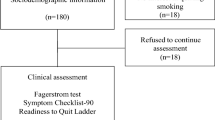Abstract
Background: Fundamental to a stage-based model of health behavior change is the assumption that there is non-linearity (or discontinuity) in the relationship between predictors and outcomes across stage boundaries. There is, however, little evidence to suggest the stages of the transtheoretical model (TTM) meet this assumption. Purpose: The aim of this study was to extend previous work on discontinuity in prediction to the TTM stage boundary between precontemplation and contemplation, and to test the homogeneity of the contemplation stage of change. Method: Repeated measures design with telephone surveys conducted two weeks apart. Participants were 708 randomly selected smokers, aged 18-40 years, in the precontemplation and contemplation stages of change. Results: An initial test of the stage boundary between precontemplation and contemplation revealed greater predictive power of a multivariate model in the precontemplation stage. Some evidence of discontinuity in prediction was found within the contemplation stage, between those “open to the possibility” of quitting and those “actually thinking about it.” The discontinuity at the TTM boundary was reduced following the exclusion of precontemplators not interested in quitting and when those thinking about quitting within contemplation were also excluded. Conclusion: The stage boundary between precontemplation and contemplation was not strongly supported, and there was weak evidence of a discontinuity within contemplation. The findings question the utility of the current operationalization of the TTM stage boundary.
Similar content being viewed by others
References
Baron, R. M., & Kenny, D. A. (1986). The moderator-mediator variable distinction in social psychological research: Conceptual, strategic and statistical considerations. Journal of Personality and Social Psychology, 51, 1173–1182.
Borland, R., & Balmford, J. (2003). Understanding how mass media campaigns impact on smokers. Tobacco Control, 12(Suppl. II), ii45-ii52.
Borland, R., Yong, H.-H., King, B., Cummings, K. M., Fong, G. T., Elton, T. E., et al. (2004). Use of and beliefs about ‘light’ cigarettes in four countries: Findings from the International Tobacco Control Policy Evaluation Survey. Nicotine and Tobacco Research, 6(Suppl. 3), S311-S321.
DiClemente, C. C., Prochaska, J. O., Fairhurst, S. K., Velicer, W. F., Velasquez, M. M., & Rossi, J. S. (1991). The process of smoking cessation: An analysis of precontemplation, contemplation and preparation stages of change. Journal of Consulting and Clinical Psychology, 59, 295–304.
Dijkstra, A., Conjin, B., & De Vries, H. (2006). A match-mismatch test of a stage model of behaviour change in tobacco smoking. Addiction, 101, 1035–1043.
Etter, J.-F., & Perneger, T. V. (1999). Associations between the stages of change and the pros and cons of smoking in a longitudinal study of Swiss smokers. Addictive Behaviors, 24, 419–424.
Heather, N. (1998). A conceptual framework for explaining drug addiction. Journal of Psychopharmacology, 12, 3–7.
Herzog, T. A., Abrams, D. B., Emmons, K. M., Linnan, L. A., & Shadel, W. G. (1999). Do processes of change predict smoking stage movements? A prospective analysis of the Transtheoretical Model. Health Psychology, 18, 369–375.
Larabie, L. C. (2005). To what extent do smokers plan quit attempts? Tobacco Control, 14, 425–428.
Menard, S. (1995). Applied logistic regression analysis (Sage University paper series on Quantitative Applications in the Social Sciences, series No. 07-106). Thousand Oaks, CA: Sage.
Prochaska, J. O., DiClemente, C. C., & Norcross, J. C. (1992). In search of how people change: Applications to addictive behaviors. American Psychologist, 47, 1102–1114.
Prochaska, J. O., Velicer, W. F., Rossi, J. S., Goldstein, M.G., Marcus, B. H., Rakowski, W., et al. (1994). Stages of change and decisional balance for 12 problem behaviors. Health Psychology, 13, 39–46.
Schumann, A., Kohlmann, T., Rumpf, H.-U., Hapke, U., John, U., & Meyer, C. (2005). Longitudinal relationships among trans-theoretical model constructs for smokers in the precontemplation and contemplation stages of change. Annals of Behavioral Medicine, 30, 12–20.
Segan, C. J., Borland, R., & Greenwood, K. M. (2006). Do trans-theoretical model measures predict forward stage transitions in smoking cessation? Manuscript submitted for publication.
Sutton, S. (1996). Can ’stages of change’ provide guidance in the treatment of addictions? A critical examination of Prochaska and DiClemente’s model. In G. Edwards & C. Dare (Eds.), Psychotherapy, psychological treatments, and the addictions (pp. 189–205). Cambridge, UK: Cambridge University Press.
Weinstein, N. D., Rothman, A. J., & Sutton, S. R. (1998). Stage theories of health behavior: Conceptual and methodological issues. Health Psychology,17, 290–299.
West, R. (2005). Time for a change: Putting the transtheoretical (stages of change) model to rest. Addiction, 100, 1036–1039.
West, R., & Sohal, T. (2006). “Catastrophic” pathways to smoking cessation: Findings from a national survey. British Medical Journal, 332, 458–460.
Author information
Authors and Affiliations
Corresponding author
Additional information
This work was supported by a postgraduate scholarship (Award Reference No. PP 02M 0899) from the National Heart Foundation of Australia to the first author and from an unrestricted educational research grant from Glaxo-SmithKline through the Australian Smoking Cessation Consortium.
Rights and permissions
About this article
Cite this article
Balmford, J., Borland, R. & Burney, S. Is contemplation a separate stage of change to precontemplation?. Int. J. Behav. Med. 15, 141–148 (2008). https://doi.org/10.1080/10705500801929791
Issue Date:
DOI: https://doi.org/10.1080/10705500801929791




